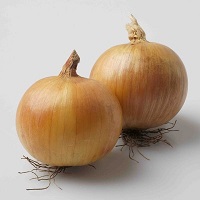Crop Type
Over winter
Skin Color
Yellow
Maturity
Mid Early

Crop Type
Over winter
Skin Color
Yellow
Maturity
Mid Early
For tomatoes:
* Pod silną presją szkodników i/lub w niekorzystnych warunkach środowiskowych i/lub w obliczu nowych biotypów, patotypów, ras lub szczepów szkodników, które mogą się wyłonić odporne odmiany mogą wykazywać pewne objawy chorobowe lub uszkodzenia. Temperatura gleby powyżej 27°C lub inne obciążenia mogą spowodować załamanie odporności na mątwika.
**Prosimy o zapoznanie się z definicjami ISF na stronie https://worldseed.org/wp-content/uploads/2022/11/Definition_on_reaction_plants_to_pests_2022_final_clean2.pdf
Egzemplarz definicji terminów opisujących reakcje roślin na szkodniki na potrzeby branży nasiennictwa roślin można uzyskać, na żądanie, w naszych biurach.
For all other crops:
* Pod silną presją szkodników i/lub w niekorzystnych warunkach środowiskowych i/lub w obliczu nowych biotypów, patotypów, ras lub szczepów szkodników, które mogą się wyłonić odporne odmiany mogą wykazywać pewne objawy chorobowe lub uszkodzenia.
**Prosimy o zapoznanie się z definicjami ISF na stronie https://worldseed.org/wp-content/uploads/2022/11/Definition_on_reaction_plants_to_pests_2022_final_clean2.pdf
Egzemplarz definicji terminów opisujących reakcje roślin na szkodniki na potrzeby branży nasiennictwa roślin można uzyskać, na żądanie, w naszych biurach.


For tomatoes:
* Pod silną presją szkodników i/lub w niekorzystnych warunkach środowiskowych i/lub w obliczu nowych biotypów, patotypów, ras lub szczepów szkodników, które mogą się wyłonić odporne odmiany mogą wykazywać pewne objawy chorobowe lub uszkodzenia. Temperatura gleby powyżej 27°C lub inne obciążenia mogą spowodować załamanie odporności na mątwika.
**Prosimy o zapoznanie się z definicjami ISF na stronie https://worldseed.org/wp-content/uploads/2022/11/Definition_on_reaction_plants_to_pests_2022_final_clean2.pdf
Egzemplarz definicji terminów opisujących reakcje roślin na szkodniki na potrzeby branży nasiennictwa roślin można uzyskać, na żądanie, w naszych biurach.
For all other crops:
* Pod silną presją szkodników i/lub w niekorzystnych warunkach środowiskowych i/lub w obliczu nowych biotypów, patotypów, ras lub szczepów szkodników, które mogą się wyłonić odporne odmiany mogą wykazywać pewne objawy chorobowe lub uszkodzenia.
**Prosimy o zapoznanie się z definicjami ISF na stronie https://worldseed.org/wp-content/uploads/2022/11/Definition_on_reaction_plants_to_pests_2022_final_clean2.pdf
Egzemplarz definicji terminów opisujących reakcje roślin na szkodniki na potrzeby branży nasiennictwa roślin można uzyskać, na żądanie, w naszych biurach.